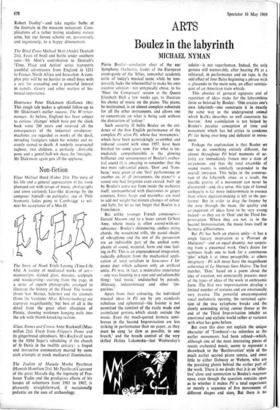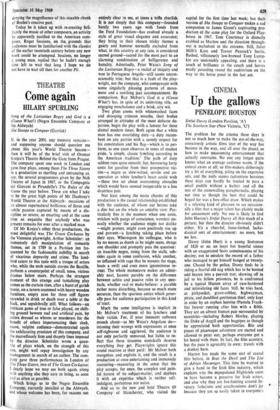Boulez in the labyrinth ARTS
MICHAEL NYMAN
Pierre Boulez—conductor elect of the BBC Symphony Orchestra, leader of the European avant-garde of the 'fifties, somewhat academic critic of today's musical scene while he tem- porarily lacks the wherewithal to make his owa creative solution—not untypically chose, in his 'Meet the Composers' session at the Queen Elizabeth Hall a few weeks ago, to illustrate his choice of music on the piano. The piano, he maintained, is an almost complete substitute for all the other instruments, and allows one to concentrate on what is being said without the distraction of 'colour.'
Such austerity ill befits Boulez on the evi- dence of the first English performance of the complete Pli selon Pli, whose five 'movements,' which have been painstakingly assembled and tinkered around with since 1957, have been finished for some years now. For what is im- mediately comprehensible is the glowing brilliance and sensuousness of Boulez's orches- tral sound (it is amazing to remember that the two most substantial pieces, 'Don' and 'Tom- beau,' were given at one 'first' performance or another on, of all instruments, the piano!): a sound one had forgotten even existed, built up by Boulez's acute ear from inside the orchestra itself, unencumbered with electronics or geiger counters. Extra harps and marimbas are used to add not weight but minute changes of colour and light, for let us not forget that Boulez is a Frenchman.
But unlike younger French composers— Gerard Masson and to a lesser extent Gi'bert Amy, whose music is often sound-without- substance—Boulez's shimmering, endless string chords, the woodwind trills, the pastel -shades of vibraphone and the rest of the percussion are an indivisible part of the unified com- plexity of sound, material, form and time feel- ing in Pli. This is an unprecedented integration, radically different from the mechanical appli- cation of total serialism in Structures 1 for piano duet which achieves only an artificial unity. Pli was, in fact, a restorative experience —one was listening to a rare and unfashionable thing: 'real music,' undisturbed by parody, illiteracy, indeterminacy and other 'im- purities.'
Apart from their colouring, the individual musical ideas in Ph are by any standards nebulous and ephemeral—the listener is not permitted the comfort of the easily made and assimilated gesture, which stands outside the music. Even the much-quoted fermata semi- breves in the Second Improvisation are less striking in performance than an paper, as they must be sung 'as slow as possible, in one breath,' and the breath control of the very skilled Halina Lukomska—last Wednesday's soloist—is not superhuman. Indeed, the only gesture still memorable, after hearing Pli at a rehearsal, in performance and on tape, is the odd effect of four flutes beginning a phrase with a glissando to the main note, an effect reminis- cent of an American train whistle.
This absence of gestural signposts and of repetition of ideas make for the labyrinthine
form so beloved by Boulez: 'One creates one's own labyrinth—one constructs it in exactly the same way as the underground animal which Kafka describes so well constructs his burrow.' And assimilation is not helped by Boulez's_ peculiar conception of time and movement which has led critics to condemn Pli for being over-long and deficient in move- ment.
Perhaps the explanation is that Boulez set out to do something entirely different, for almost throughout PIP brief moments of ac- tivity are immediately frozen into a state of su-pension. and thus the total ensemble of sound events is similarly suspended in the_ overalltimespan. This helps in the construc- tion of the labyrinth, since, as a result, the specific gravity of a movement can never be discovered—and, in a sense, this type of formal ambiguity is far more indeterminate in essence than where decision-making is left to the per- former But in order to drag the 'listener by the nose through the maze, the quality and arrangement of ideas have to be very strong indeed—as they are in 'Don' and the Third Im- provisation. Where they are not, as in the Second Improvisation, the music loses itself in hermetic diffusiveness.
But Pli has both an elusive unity—it has a single literary inspiration as a 'Portrait de Mallartni—and an equal disunity, not surpris- ing from a piecemeal work. One's desire for synthesis leads one to look for a continuous 'plot' which is at times perceptible, at others imaginary—Pli will never have the magnificent coherence of Le Marteau Sans Maitre. The first number, 'Don,' based on a poem about the idea of creation, not unnaturally presents most of the types of ideas of the work in embryonic form. The first two improvisations develop a limited number of textures and are emotionally, very evasive. The powerful unaccompanied vocal melismatic opening, the sustained agita- tion of the two xylophone breaks and the slowly unwinding string cantus firmus at the end of the Third Improvisation inhabit an emotional and stylistic world rather at variance with what has gone before.
But even this does not explain the unique character of `Tombeau'—as relentless as the earlier movements had been refined—which, although one of the most interesting pieces of recent orchestral music, seems to represent a
throwback to the 'Beethovenian' style of the much earlier second piano sonata, and owes little to either Debussy or Webern, who are the presiding ghosts behind the earlier part of the work. There is no doubt that it is an 'effec- tive' close and summation to Boulez's magnum opus, even though the question remains open as to whether it makes Pli a -total experience or merely a sequence of five movements of different shapes and sizes. But there is no
denying the magnificence of this sizeable chunk of Boulez's creative past.
Today he is taken up with re-creating bril- liantly the music of other composers, an activity be apparently justified to the American com- poser, Roger Sessions, on the, grounds that audiences must be familiarised with the classics of the earlier twentieth century before any new work could be attempted. Sessions, no longer a young man, replied that he hadn't enough time left to wait that long. I hope we do not have to wait till then for another Pli.







































 Previous page
Previous page